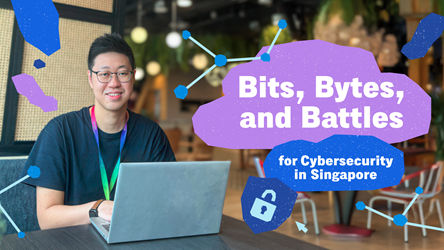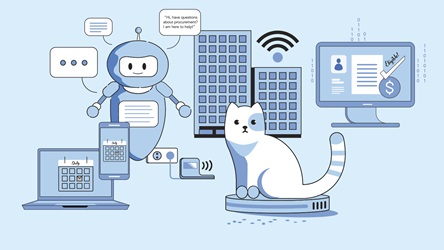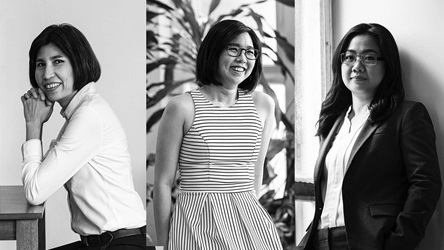Transforming Careers With The Drive To Learn
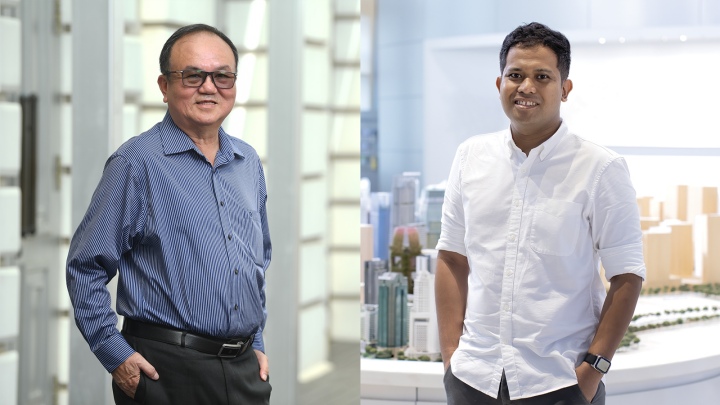
For nearly 20 years, Mr Jason Quek’s daily routine consisted of hectic shifts on the assembly line and in shipping, before heading straight to night classes without fail.
Today, the Workplace Safety and Health (WSH) officer at Republic Polytechnic (RP) embodies the spirit of life-long learning.
The father of four has achieved numerous qualifications – from a diploma in project management in 2006, and a Bachelor’s degree in engineering and business management in 2012. Now, he is working towards his Master’s degree.
While working in the marine industry doing operations risk assessment, Mr Quek had to clamber up and down dizzyingly tall ships, training workers on how to react in high-stress, emergency situations such as a fire or having insufficient oxygen in enclosed spaces.
Those experiences prompted him to switch to being a full-time WSH officer at RP, where he has worked for the last seven years. Each day, he patrols the campus, looking out for safety hazards such as frayed electrical wiring and potential falling objects – especially during renovation and upgrading of facilities on campus.
While in this role, Mr Quek took up a part-time degree awarded by the Singapore University of Social Sciences (SUSS), a Bachelor of Science in Human Factors in Safety, at age 58. With all his expertise gained over the years, he soon became the go-to person on safety issues.
Staff frequently seek his advice. During a renovation project that would combine two science labs, RP lecturers asked if it would be advisable to remove one of two emergency eyewash and safety shower stations.
“I encouraged them to think deeper. In an emergency situation in the lab, ‘do you think you can react in 10 seconds to reach the station?’” said Mr Quek with a smile.
As a WSH Committee member and fire safety manager, Mr Quek sets up campus-wide cross-department safety audit checks, facilitates annual fire drills and regularly trains fire wardens.
His studies have helped him “better understand human factors” in shaping attitudes towards safety, and equipped him with better persuasion skills to explain why tasks should be performed a certain way.
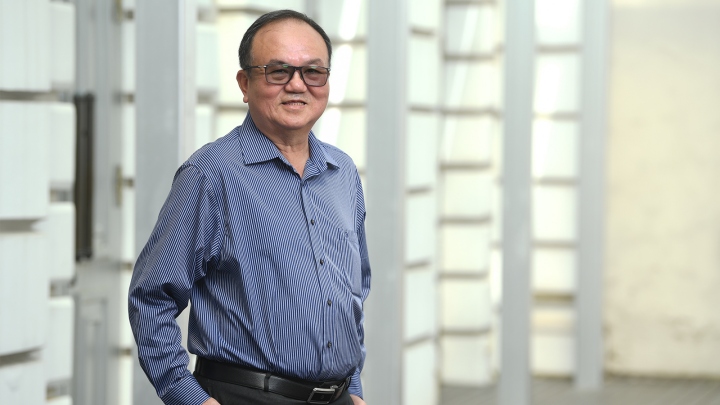
Changing minds and safety culture
Mr Quek also seeks to instil a safety mindset among RP staff and students through fun yet realistic experiences during sharing sessions with staff and students.
Determined to spark change, Mr Quek pioneered in 2017 a three-day “Workplace, Integrated Safety, Health, Environment, Security” (WISHES) event for RP staff and students.
With lifelike simulations, hospitality students tried firefighting in a mobile kitchen, while science students learnt how to properly dispose chemical waste. Tapping on his contacts, Mr Quek also invited industry guest speakers to share useful insights on fire safety and workplace security.
Mr Quek is proud to have seen the RP safety culture transform into one that is more “bottom-up” through collaborative effort among colleagues, where they also help to keep a look out for one another.
Zero to hero
Like Mr Quek, Muhammad Syafi’e Bin Sa’at’s passion for learning led to a radical transformation in his career.
In 2007, starting out in a temporary role at the Urban Redevelopment Authority (URA) as a technical officer, Syafi’e had zero knowledge of urban planning and architecture. In fact, the Ngee Ann Polytechnic graduate had studied an unrelated field – he has a diploma in mechatronics engineering, majoring in product design.
He quickly found himself in the deep end while helping out on the digitalisation of the Master Plan 2008, a statutory land use plan that guides Singapore's development over the next 10 to 15 years. This involved laboriously plotting out information from physical maps into a digital format.
It was his first brush with the geographic information system (GIS), a software that helps urban planners visualise spatial data, analyse patterns and paint various urban scenarios.
From there, his interest grew. When the URA offered a study award in late 2013, Syafi’e jumped at the chance to pursue urban design and planning at the University of Melbourne.
Returning to the URA after his graduation in November 2016, Syafi’e joined the Master Plan Review Digitalisation Team.
He observed that staff would print out hard copies of different plans from various government agencies, and pore over them for hours with tracing paper to pick out the differences. It was then that Syafi’e had the brainwave to create an automated geo-processing tool that could highlight any discrepancies more efficiently.
That was one of the “toughest and most stressful periods” of his career, Syafi’e said. He spent “weeks and long nights researching, developing and testing”.

Finally, after six months, the EPIC-ker tool was complete. Using it to compare the URA’s Master Plan 2014, the Land Transport Authority’s Road Line Plan and national water agency PUB’s Drainage Interpretation Plan reduced work by more than 2,000 man-hours.
Today, Syafi’e is a highly skilled planner with GIS knowledge. Even technical teams seek his expertise when they encounter problems using GIS. The self-professed “introvert” can now confidently lead, coach and share with others about what he has learnt and the processes he developed.
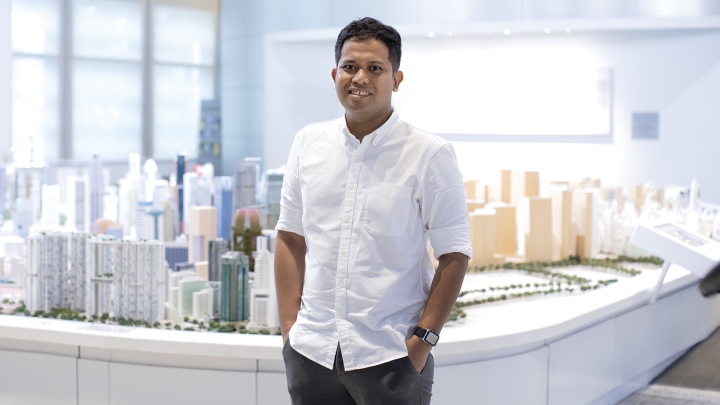
A turning point
Looking back, Syafi’e credits a major turning point when his parents divorced in his youth. He and his three siblings battled homelessness and emotional turmoil. Syafi’e grappled with the difficult decision of whether to continue his studies or work full-time to support his family with the finances.
He eventually pursued his studies, but took up a night job working 12-hour shifts three nights a week. During the day, he would rush to finish his school projects. Internet access was a luxury, and he would go to the public library to do research or submit homework online.
“That is where my motivation to keep learning started. If I hadn’t continued my studies to keep learning, I wouldn’t be hired by the URA and I wouldn’t be able to give my mum a comfortable life that she deserves,” he said.
“In the process, it made me realise that continuous learning is not limited to doing a diploma. You can also learn and pick up new skills by watching YouTube videos on related topics,” he said.
Syafi’e finds joy learning in various forms – whether it be formal courses, on-the-job training, cross-department learning, continuous self-learning or experimentation.
What’s next
Already, Syafi’e has his sights on his next goal: completing a Master’s in either applied GIS or urban planning. He is also an avid believer of making time for varied hobbies – from listening to podcasts on the commute to office, fishing, martial arts and most recently, drone photography. “The more you have to do, the more mistakes you make, and the more you will learn.”
As for Mr Quek, even as his retirement draws near this year, he is taking on a Master of Adult Learning in SUSS.
He also hopes to take courses in IT and virtual reality, which he believes can provide more immersive training experiences. “There is always something more to learn when you want to challenge yourself. I plan to carry on in my current job as I still feel very active and energetic,” he said.
The takeaway
- Use existing experiences to inform future career plans
Like Mr Quek moving from shipyard risk assessment to workplace safety in his later years, what current areas of work can you expand on for your next career move? - Be observant
Syafi’e replaced pen-and-paper processes with an automated program. Which unnecessarily tedious workplace processes can be improved with technology? How can you get support in implementing the idea? - Seize further learning opportunities
Syafi’e was offered the opportunity to pursue urban design and planning by his agency. Check with your supervisor or HR department on what advanced learning courses you can pursue.
- POSTED ON
Jul 16, 2019
- TEXT BY
Toh Ee Ming
- PHOTOS BY
catspace / Courtesy of the Public Service Division
-
Infographics
Projects That Push Productivity







